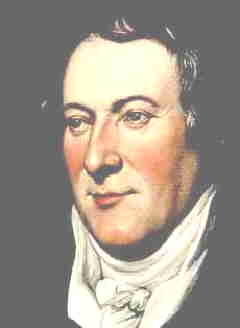On this date in 1763, William Maclure, now known as the “Father of American Geology,” was born to a wealthy family in Ayr, Scotland. He visited the United States as a teenager, made a fortune in the import-export business in London and became a U.S. citizen in 1796, where he conducted studies that eventually became the U.S Geological Survey. Maclure’s map, the first widely available geologic map, was published in 1809 as part of the paper Observations on the Geology of the United States. He was president of the Academy of Natural Sciences of Philadelphia (1817–37).
In 1824, along with social reformer Robert Owen, Maclure established a short-lived utopian community in New Harmony, Indiana. In 1838 he founded the first free public library in Indiana, the New Harmony Workingmen’s Institute. Maclure lived in Mexico from 1827 until his death 13 years later at age 76.
He became critical of formal religion early in life due to his experience with the Calvinist Church of Scotland, which taught that everyone was inherently sinful. He called religion a “delusion” and said there was “nothing beyond the grave.” (Maclure of New Harmony: Scientist, Progressive Educator, Radical Philanthropist by Leonard Warren.) He was disdainful of the clergy: “The priests have retained their consideration and labor hard in their calling for the propagation of ignorance, superstition, and hypocracy [sic],” Maclure wrote in his journal while visiting France in 1807. (D. 1840)


